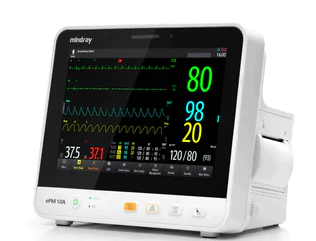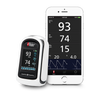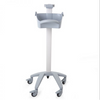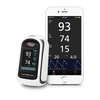If your practice treats patients who suffer from chronic obstructive pulmonary disease (COPD) and require long-term oxygen therapy, then you likely need to invest in a set of nasal cannulas. These devices are simple and effective at administering oxygen. As you consider which type of nasal cannula to purchase, here are a few of our most common devices.
Common Questions About Buying Nasal Cannulas
What is a nasal cannula?
Think of a nasal cannula as a flexible tube that opens into two prongs. The prongs are designed to sit comfortably in the nose, one in each nostril. These devices are used to administer airflow to patients who are suffering from respiratory problems, with COPD being the most common example.
What are the benefits of having a nasal cannula?
Nasal cannulas are not the only means of administering oxygen therapy, but they are often the most effective. There are a number of advantages to using nasal cannulas in your facility, including the fact that nasal cannulas are very easy to use. They are lightweight, portable, and generally quite affordable.
Are nasal cannulas only used in clinical care settings?
While nasal cannulas are often used in medical facilities, including hospitals, they can also be used on the go (for emergency or ambulatory care). Patients who live with chronic respiratory problems may also have cannulas for use at home.
Are all nasal cannulas the same?
While the nasal cannula may seem like a very simple device, it may be more complex than you think. Certainly, many options and distinctions exist between nasal cannulas.
Size
Unlike intravenous cannulas, which come in numbered sizes, nasal cannulas generally just come in three basic sizes: infant, child, and adult.
Flow Rate
Regular cannulas usually have a lower oxygen flow, while high-flow nasal cannulas administer oxygen at a higher/faster rate.
What is the difference between a high-flow nasal cannula and a regular cannula?
High-flow nasal cannulas deliver oxygen at a flow rate of up to 60 liters per minute. By contrast, a regular cannula offers oxygen at a flow rate of just four to six liters per minute, on average.
Most high-flow nasal cannulas actually heat the air before administering it. Colder, dryer air can contribute to inflammation, so heating the air offers an added therapeutic benefit for patients who have sensitive nasal airways. Additionally, high-flow nasal cannulas are often lighter and considered to be more comfortable for the patient.
How long can a nasal cannula be used?
Nasal cannulas are not meant to last forever, and it is important to know when yours needs to be discarded and replaced with a new one. Generally speaking, a nasal cannula can be used for a week or so before it needs to be replaced, but only if it is kept clean through proper, regular upkeep.
How do I clean it?
Nasal cannulas should be cleaned at least once a day, ideally with a sanitizing solution to keep them bacteria-free. This significantly reduces the risk of infection and can also extend the functional life of your cannula. Alternatively, nasal cannulas can be washed in a combination of water and vinegar.
What are the disadvantages of using a nasal cannula?
There can certainly be some risks associated with using a nasal cannula. The most common side effect is irritation or inflammation of the airways, which is caused by dry or cool air. High-flow nasal cannulas can limit this risk. Alternatively, getting an oxygen tank with a built-in warmer or humidifier can help.
Also, note that long-term use of supplemental oxygen can sometimes put patients at risk for lung damage and eye damage. Regular check-ups and evaluations are recommended for these patients.
What conditions can be treated with a nasal cannula?
While nasal cannulas are most commonly associated with COPD, they may also be used to administer oxygen therapy to patients with the following conditions:
- Asthma
- Sleep apnea
- Pneumonia
- Cystic fibrosis
What is the best way to buy a nasal cannula?
To ensure high-quality products and sufficient support, it is always best to purchase medical equipment from a reputable retailer, such as hampMed. If you have any specific questions about purchasing, maintaining, or using a nasal cannula, we welcome you to contact us directly. You can also check out our collection of nasal cannulas.





